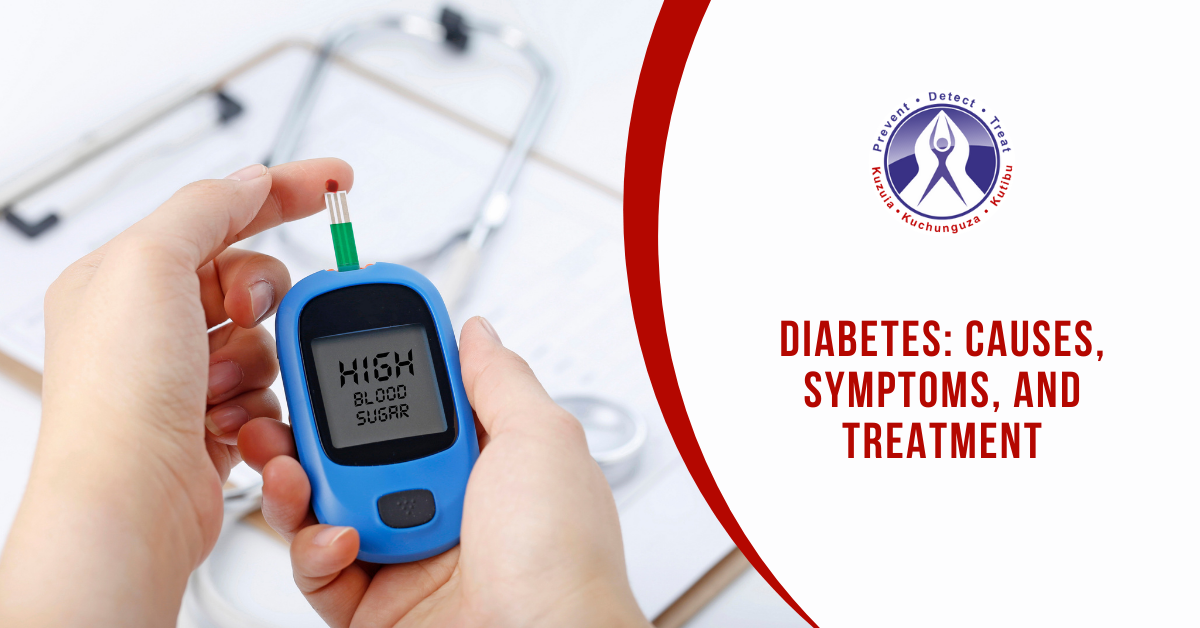Diabetes: Causes, Symptoms, and Treatment
963 viewsDiabetes mellitus, commonly known as diabetes is a disease that has spread far and wide in the world today. According to the international diabetes federation, around 20% of the population above 65 years of age had diabetes in 2019 and diabetes had caused around 4.2 million deaths worldwide. The best preventive measure in such a scenario is to be aware of diabetes causes, symptoms, and treatment. We have covered everything you must know about diabetes and its types in this blog.
What is diabetes?
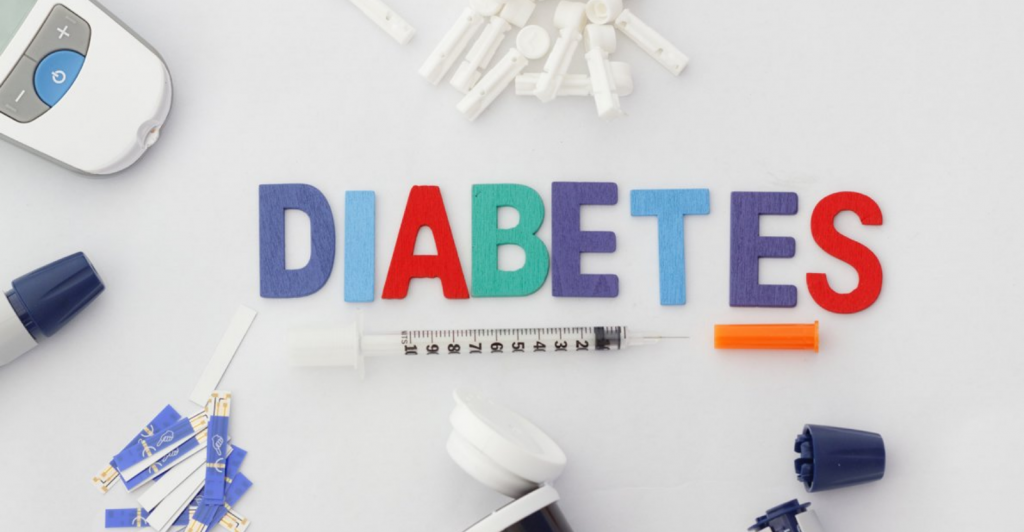
Diabetes is a disease in which the patient suffers from abnormally high blood sugar levels. There are 4 common types of diabetes:
Type 1 diabetes a.k.a autoimmune disease
It is a type of diabetes in which the immune system of the body attacks and destroys cells in the pancreas.
Type 2 diabetes
This the most common type of diabetes, also known as diabetes mellitus. In this type of diabetes, the body becomes resistant to insulin and sugar starts building up in the blood.
Gestational diabetes
This is a type of diabetes normally found in pregnant ladies wherein the insulin blocking hormones produced by the placenta is responsible for causing the disease.
Prediabetes
Prediabetes is a condition wherein the blood sugar levels are not high enough to classify the disease as type 2 diabetes but are neither low enough to classify the condition as normal.
What causes diabetes
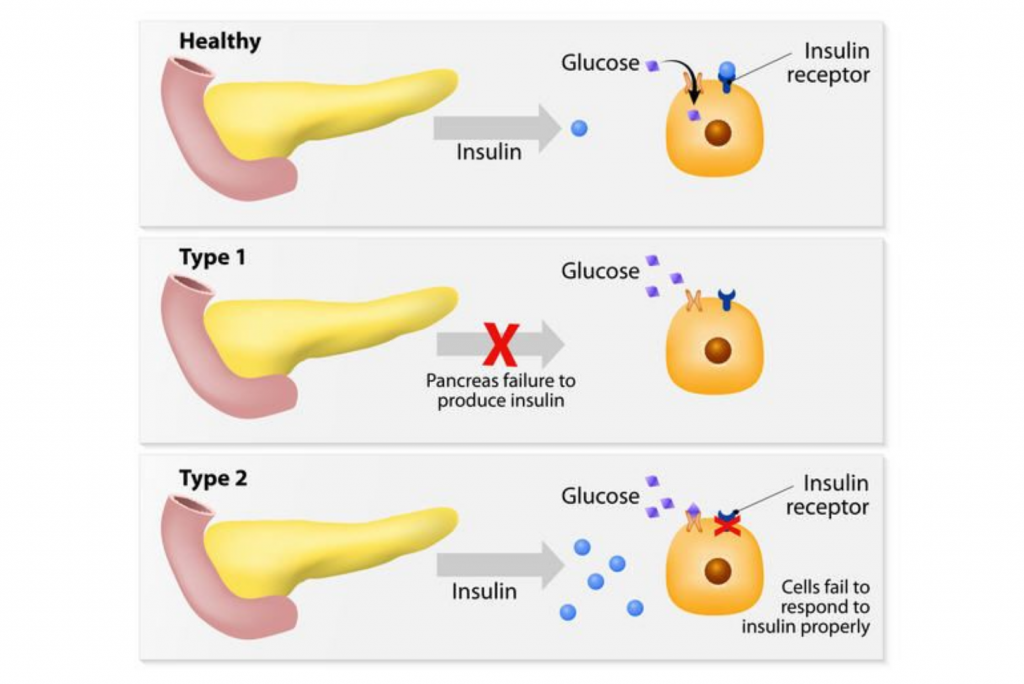
Glucose provides energy for the cells of the body, through which the body derives energy for day-to-day purposes. A hormone known as insulin is responsible for processing glucose in the blood.
If for some reason, the body can’t make enough insulin or cannot effectively use the insulin then the blood sugar levels shoot up. This leads to diabetes.
Symptoms of diabetes
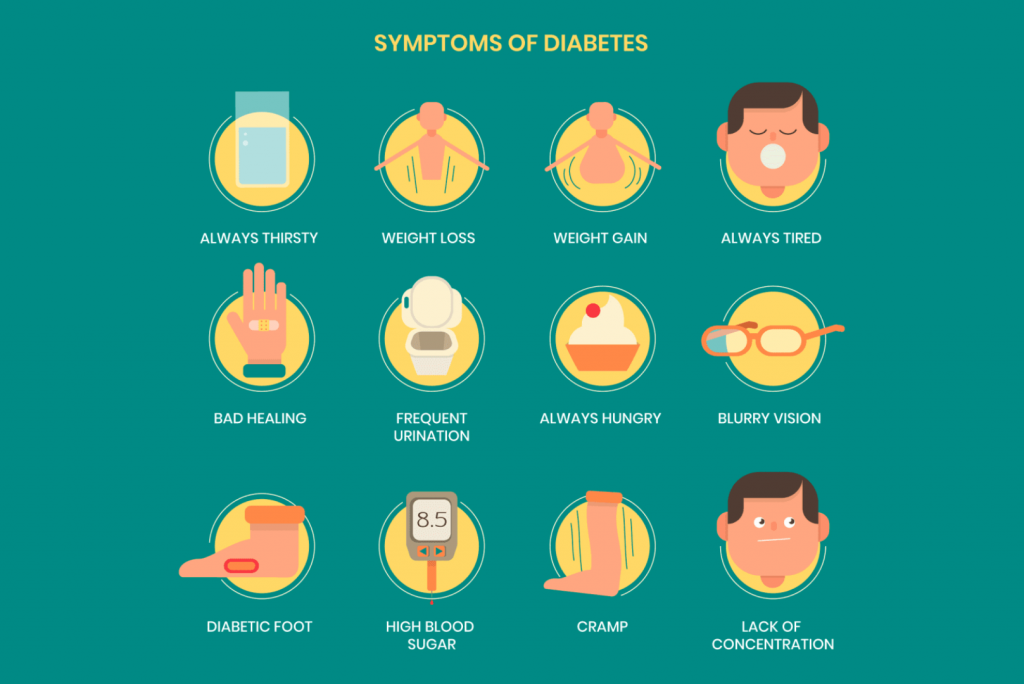 Here are some of the telltale signs that you might have to get your diabetes test done quickly.
Here are some of the telltale signs that you might have to get your diabetes test done quickly.
- You feel thirsty
- Extreme fatigue is felt
- Drowsiness becomes common
- Headache
- Weakness
- Excessive urination especially during night time
- Dry mouth
- Visual disturbance
- Your cuts and bruises don’t heal properly
- Excessive weight loss
- Decreased sex drive and erectile dysfunction in men along with poor muscle strength
- Urinary tract infections, yeast infections, itchy and dry skins are common symptoms in women
Note that normally prediabetes patients are asymptomatic while patients having other kinds of diabetes have similar symptoms.
However, there is an important difference between type 1 and type 2 diabetes as the symptoms appear suddenly in type 1 while they appear gradually in type 2.
Diabetes risk factors
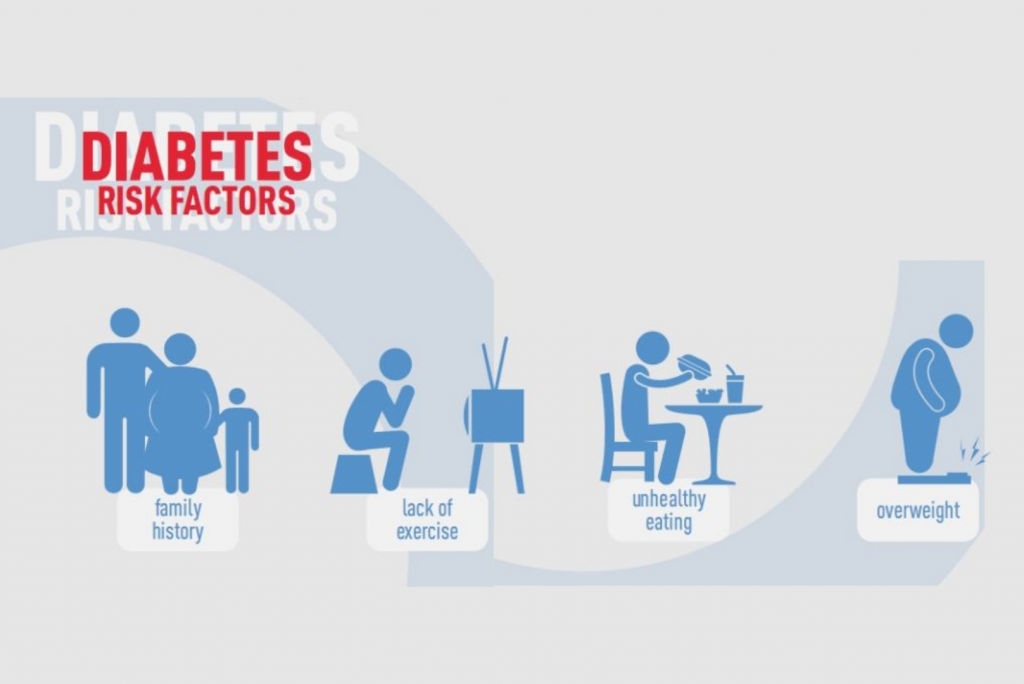
Type 1 diabetes is normally genetic and children and adolescents are at high risk for this type of condition.
You are at risk for type 1 diabetes if
- You have a family history of diabetes
- The food which you intake is full of toxins
- You have pancreatic disorders
You will be at risk for type 2 diabetes in case of
- A family history of diabetes
- Obesity
- High blood pressure
- Hormonal fluctuations
- Low levels of HDL (good cholesterol)
- A history of gestational diabetes
- Consuming alcohol or tobacco
Gestational diabetes can occur to you if
- You have previously given birth to a child which weighed less than 4 kg
- If you have a family history of diabetes
- You have Polycystic ovarian syndrome
- Smoking
Complications that diabetes can cause
There are no major complications that arise out of diabetes alone. However, in certain severe cases, the following complications may occur:
- Diabetes can damage the peripheral nervous system which can lead to neuropathy
- It can cause cognitive impairment or memory loss
- Foot ulcers or gangrene can occur due to diabetes and it can also lead to amputation or loss of limbs
- Ketoacidosis is a life-threatening complication in which the excessive presence of ketones can cause acidosis, leading to toxic complications in the body
- Diabetes can cause blockage of blood vessels which can ultimately lead to stroke
- It can cause retinopathy and vision loss
- Depression and dementia in some cases
How is Diabetes diagnosed?
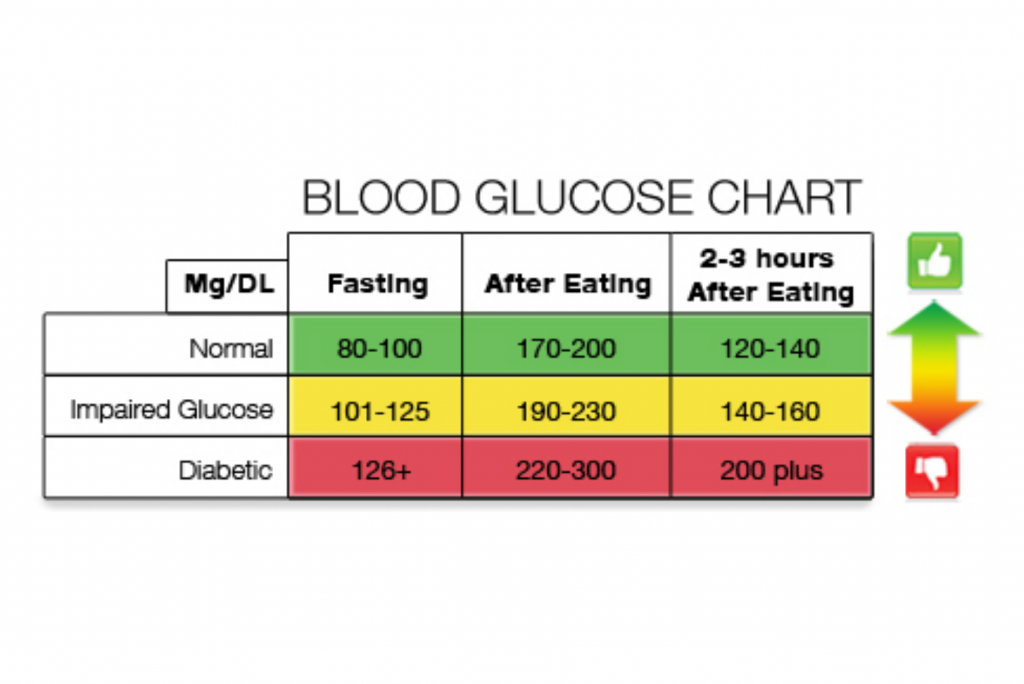 The importance of timely diagnosis cannot be understated, for any disease. Knowledge of diabetes causes, symptoms and treatment is essential for its timely diagnosis. The following are the recommended tests for diagnosing diabetes:
The importance of timely diagnosis cannot be understated, for any disease. Knowledge of diabetes causes, symptoms and treatment is essential for its timely diagnosis. The following are the recommended tests for diagnosing diabetes:
A1C test
In this test, we measure the average blood sugar level over the past 2 to 3 months. A1C below 5.7% is considered normal and above 6.5% indicates that you have diabetes. if the A1C level comes between 5.7 and 6.4% then it indicates that you have prediabetes.
Glucose tolerance test
In this test, your blood sugar levels before and after you drink a liquid that contains glucose are measured. The most important point is that before you undertake this test you will have to fast overnight and have your blood sugar level measured. After that, the doctor will provide you a glucose liquid, and your blood sugar level will be checked after 1 hour, 2 hours, and 3 hours after you have drunk the liquid.
At 2 hours, a blood sugar level of 140 MG/dl or lower is considered normal while a blood sugar level of 200 mg/dl or higher indicates that the patient has diabetes. If the blood sugar level comes in between 140 and 199 mg/dl, then it indicates that you have prediabetes.
Fasting blood sugar test
In this test, your blood sugar level is measured after an overnight fast. A fasting blood sugar level of 99 mg/dl or lower is normal. A blood sugar level above 126 mg/dl is high, indicating that the patient has diabetes.
A level between 100 to 125 mg/dl is considered prediabetic.
Random blood sugar test
Random blood sugar test measures the blood sugar levels in the patient at the specific time of testing. This type of test does not require fasting. A blood sugar level of 200 mg/dl or higher is diabetic.
Testing the blood for autoantibody is also a common method of detecting type 1 diabetes.
Moreover, your doctor may consider getting your urine tested for identifying ketones, which are an indicator of type 1 diabetes.
The right treatment for diabetes
Your doctor can tell you the right treatment for diabetes based on your medical history. However, common diabetes treatment options are:
Insulin dosage
Administering insulin via injections helps diabetic patients control blood glucose levels.
Pancreatic transplantation
Patients with type 1 diabetes can consider this treatment wherein pancreas transplantation is done from healthy donors to the patient. However, this diabetes treatment is still new and medical research is going on to find out the potential risks.
Oral medications
Common medications for diabetes include glitazones, sulfonylureas, and biguanides. They help in stimulating the production of insulin from the pancreas or inhibit the breakdown of fats.
How to live a healthy life as a diabetic
The most vital aspect of healthy living as a diabetic is to know diabetes causes, symptoms, and treatment well. Diabetes is not always a very serious issue and it is absolutely possible to lead a normal life with diabetes. You might have to make some lifestyle changes like
- Avoid excessive alcohol intake
- Engage in at least 30 minutes of medium to high-intensity exercises like brisk walking, riding a bicycle, aerobics, or swimming 5 days a week
- Eat a healthy fresh and nutritious diet which includes fruits and vegetables Kamali proteins, nuts, and whole grains
Conclusion
Prevention is better than cure. The more you know diabetes causes, symptoms, and treatment, the better you will be able to prevent or manage it. Although diabetes is a massively common disease, fortunately, most patients can live a very healthy life as diabetics. The most important aspect, however, is to get it diagnosed in time. With timely diagnosis and treatment, a diabetic patient can live a life just like someone who doesn’t have the disease.
Regency Medical Centre has the most advanced diagnostic centre in Tanzania for diabetes and other diseases. If you show any diabetes symptoms, consult our veteran doctors for excellent diabetes treatment.

